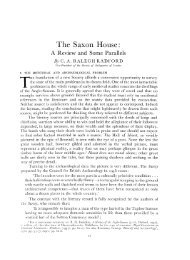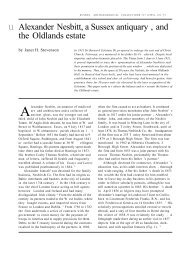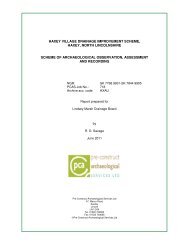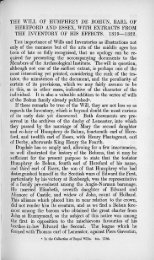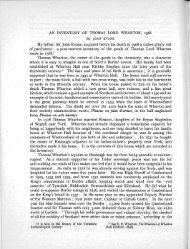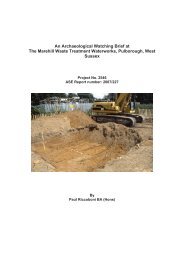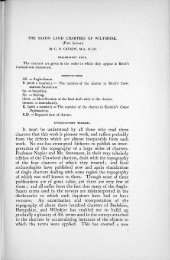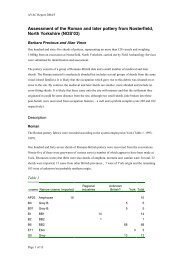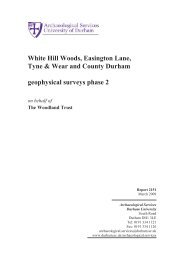ROMAN URBAN TOPOGRAPHY in Britain and the western Empire
ROMAN URBAN TOPOGRAPHY in Britain and the western Empire
ROMAN URBAN TOPOGRAPHY in Britain and the western Empire
Create successful ePaper yourself
Turn your PDF publications into a flip-book with our unique Google optimized e-Paper software.
First my previous example, Aix-en-Provence: <strong>the</strong>re we<br />
have a Roman valley settlement tak<strong>in</strong>g over from <strong>the</strong><br />
hillfort (or hill-town) of <strong>the</strong> Salluvii, destroyed by Sextius<br />
Calv<strong>in</strong>us. Its orig<strong>in</strong> lies <strong>in</strong> <strong>the</strong> geographical <strong>and</strong> military<br />
<strong>in</strong>terest Republican Rome had <strong>in</strong> protect<strong>in</strong>g her route by<br />
sea from Italy to Spa<strong>in</strong>. This depended vitally on <strong>the</strong><br />
friendship of Marseilles <strong>and</strong> her satellites. Harassment of<br />
Marseilles by <strong>the</strong> Salluvii brought <strong>in</strong> Rome, first <strong>in</strong> <strong>the</strong><br />
form of expeditions, <strong>the</strong>n of settlement. But <strong>the</strong> long-term<br />
success of Aix was strongly <strong>in</strong>fluenced both by <strong>the</strong><br />
excellent choice of <strong>the</strong> site <strong>in</strong> <strong>the</strong> local l<strong>and</strong>scape <strong>and</strong>, with<br />
<strong>the</strong> construction of <strong>the</strong> coastal highway, by a key position<br />
<strong>in</strong> <strong>the</strong> communications system.<br />
In <strong>the</strong> same region we can observe Arles, <strong>in</strong> whose story<br />
<strong>the</strong>re is a strong watery element. It starts with Marius’s<br />
construction of <strong>the</strong> canal system to help solve <strong>the</strong> problems<br />
of <strong>the</strong> Rhône delta, at least partially <strong>in</strong> <strong>the</strong> <strong>in</strong>terest of<br />
Marseilles. It cont<strong>in</strong>ues ironically <strong>in</strong> <strong>the</strong> consequent<br />
choice of Arles as <strong>the</strong> base from which Julius Caesar<br />
launched his waterborne attack on that same city, which<br />
had sided with Pompey. Its long-term economic prosperity<br />
was closely bound up with <strong>the</strong> emergence of a powerful<br />
guild of shippers, profit<strong>in</strong>g from <strong>the</strong> location of Arles at a<br />
po<strong>in</strong>t ideal for <strong>the</strong> transshipment of cargoes from river<br />
craft or l<strong>and</strong> transport to sea-go<strong>in</strong>g vessels. The l<strong>in</strong>k<strong>in</strong>g of<br />
river <strong>and</strong> sea <strong>in</strong> a navigable form was crucial. That l<strong>in</strong>k<strong>in</strong>g<br />
had a partially political orig<strong>in</strong>; its consequences were both<br />
military <strong>and</strong> economic.<br />
Arles, however, also demonstrates ano<strong>the</strong>r important<br />
geographical factor. To <strong>the</strong> north-east lay <strong>the</strong> ridges of <strong>the</strong><br />
Alpilles, whence major aqueducts were to br<strong>in</strong>g watersupplies,<br />
<strong>and</strong> to <strong>the</strong> south-east was <strong>the</strong> vast open Pla<strong>in</strong>e de<br />
la Crau. The l<strong>and</strong> was ideal for a veteran colony, <strong>and</strong> on<br />
geographical grounds alone it is not surpris<strong>in</strong>g that Julius<br />
Caesar chose it as a site with which to reward his Sixth<br />
legion, nor that it was much enlarged <strong>and</strong> developed under<br />
Augustus. But we should not forget <strong>the</strong> political po<strong>in</strong>t -<br />
that <strong>the</strong> territory of Marseilles had fallen <strong>in</strong>to Caesar’s<br />
h<strong>and</strong>s as that of a defeated enemy. Many years ago Sir Ian<br />
Richmond (1946) suggested that L<strong>in</strong>coln <strong>and</strong> Gloucester<br />
were founded as colonies where <strong>the</strong>y were because, at <strong>the</strong><br />
end of <strong>the</strong> 1st century, <strong>the</strong> lesson of Colchester <strong>and</strong> <strong>the</strong><br />
Boudican revolt had been learnt. He argued that because<br />
both Gloucester <strong>and</strong> L<strong>in</strong>coln lay adjacent to areas that<br />
seemed relatively underpopulated <strong>in</strong> <strong>the</strong> late Iron Age,<br />
<strong>the</strong>y were judged by <strong>the</strong> Romans less likely to provoke<br />
resentment at l<strong>and</strong> settlement by veterans. It is certa<strong>in</strong>ly<br />
true that mish<strong>and</strong>l<strong>in</strong>g of <strong>the</strong> once friendly local aristocracy<br />
of <strong>the</strong> Tr<strong>in</strong>ovantes <strong>and</strong> expropriation of <strong>the</strong>ir l<strong>and</strong> by<br />
colonists had much to do with <strong>the</strong> revolt. But Arles<br />
suggests ano<strong>the</strong>r possibility: <strong>the</strong> conjunction of <strong>the</strong> right<br />
sort of l<strong>and</strong> with its hav<strong>in</strong>g passed (recently or years<br />
before) <strong>in</strong>to imperial h<strong>and</strong>s by right of conquest.<br />
Remember<strong>in</strong>g that <strong>the</strong> royal estates of defeated peoples<br />
automatically passed to <strong>the</strong> emperor, we may perhaps<br />
guess that at Colchester <strong>the</strong> fortress, first, <strong>and</strong> <strong>the</strong> colonia,<br />
subsequently, were established on l<strong>and</strong> that had belonged<br />
to <strong>the</strong> Catuvellaunian k<strong>in</strong>gs. Tacitus (Annals, xii.32)<br />
specifically states that <strong>the</strong> colony was founded <strong>in</strong> agri<br />
captivi. It is perhaps not an unreasonable pil<strong>in</strong>g of<br />
speculation on speculation to suspect that this l<strong>and</strong> had<br />
once been <strong>the</strong> doma<strong>in</strong> of Tr<strong>in</strong>ovantian pr<strong>in</strong>ces, was<br />
restored to M<strong>and</strong>ubracius by Caesar, but was not allowed<br />
to revert to Tr<strong>in</strong>ovantian ownership under Claudius.<br />
69<br />
Salway: Geography <strong>and</strong> <strong>the</strong> growth of towns, with special reference to Brita<strong>in</strong><br />
Indeed it may have been <strong>the</strong> absence of a legitimate family<br />
claim - we hear noth<strong>in</strong>g of a restored Tr<strong>in</strong>ovantian royal<br />
family - that made <strong>the</strong> colonia <strong>in</strong>itially acceptable. The<br />
subsequent seizure of properties from o<strong>the</strong>r lead<strong>in</strong>g<br />
Tr<strong>in</strong>ovantian families by <strong>the</strong> colonists of Colchester, one<br />
of <strong>the</strong> pr<strong>in</strong>cipal causes of <strong>the</strong> Boudican revolt, will <strong>the</strong>n<br />
have seemed all <strong>the</strong> more <strong>in</strong>tolerable than if <strong>the</strong> whole<br />
district had been expropriated at <strong>the</strong> moment of conquest.<br />
Ownership of l<strong>and</strong> - or rights over it - is an important<br />
element <strong>in</strong> geography. It has a particularly important<br />
bear<strong>in</strong>g on any deeper underst<strong>and</strong><strong>in</strong>g of l<strong>and</strong> utilization.<br />
What sense, for example, could we make of <strong>the</strong> Highl<strong>and</strong><br />
Clearances if we knew noth<strong>in</strong>g about l<strong>and</strong> ownership <strong>in</strong><br />
Scotl<strong>and</strong>? It is <strong>the</strong>refore particularly frustrat<strong>in</strong>g that we<br />
have so little <strong>in</strong>formation about l<strong>and</strong> ownership <strong>in</strong> Roman<br />
Brita<strong>in</strong> - but this does not absolve us from be<strong>in</strong>g aware of<br />
<strong>the</strong> question.<br />
Sensitivity about <strong>the</strong> sit<strong>in</strong>g of colonies <strong>and</strong> <strong>the</strong> necessary<br />
acquisition of l<strong>and</strong> for <strong>the</strong> colonists was deeply engra<strong>in</strong>ed<br />
<strong>in</strong> <strong>the</strong> Roman consciousness. If it had not been part of <strong>the</strong><br />
common currency it is difficult to underst<strong>and</strong> how Vergil<br />
could have risked be<strong>in</strong>g so bold as to raise <strong>the</strong> issue openly<br />
<strong>in</strong> <strong>the</strong> dangerous days of <strong>the</strong> Second Triumvirate. The<br />
dispossessed Italian farmer laments to his more fortunate<br />
friend (Eclogues, i.64-6): ‘. . .<strong>the</strong> rest of us must leave -<br />
some to suffer <strong>the</strong> parch<strong>in</strong>g thirst of Africa, o<strong>the</strong>rs to<br />
Scythia.. .yet o<strong>the</strong>rs, almost <strong>the</strong> whole world away, to jo<strong>in</strong><br />
<strong>the</strong> Britons’.<br />
The reality that lies beh<strong>in</strong>d <strong>the</strong> poetic embroidery on<br />
<strong>the</strong> fate of <strong>the</strong> dispossessed is <strong>the</strong> reality that lies beh<strong>in</strong>d<br />
<strong>the</strong> bl<strong>and</strong> words of Augustus’s Res Gestae (28):<br />
I founded colonies from my soldiers <strong>in</strong> Africa,<br />
Sicily, Macedonia, both <strong>the</strong> Spa<strong>in</strong>s, Achaea, Asia,<br />
Syria, Gallia Narbonensis, <strong>and</strong> Pisidia. And <strong>in</strong> Italy<br />
itself I created 28 colonies on my authority.<br />
. . colonies that have become exceed<strong>in</strong>gly populous<br />
<strong>and</strong> reached <strong>the</strong> heights of renown with<strong>in</strong> my<br />
own lifetime.<br />
Compensation had, <strong>in</strong>deed, been paid s<strong>in</strong>ce <strong>the</strong> late<br />
Republic. The offence to public op<strong>in</strong>ion was <strong>the</strong> loss of <strong>the</strong><br />
ancestral home, however humble, <strong>and</strong> <strong>the</strong> destruction of<br />
traditional communities. Forty years or so after <strong>the</strong> event,<br />
Augustus could perhaps afford to gloss over <strong>the</strong> acts of <strong>the</strong><br />
Second Triumvirate <strong>and</strong> take <strong>the</strong> credit for <strong>the</strong> good that<br />
had come out of <strong>the</strong> colonization. But <strong>the</strong> despair<br />
chronicled by Vergil is a feel<strong>in</strong>g that cautious emperors<br />
must have borne <strong>in</strong> m<strong>in</strong>d when weigh<strong>in</strong>g up <strong>the</strong> advantages<br />
<strong>in</strong> prestige <strong>and</strong> <strong>the</strong> need to provide for discharged<br />
veterans aga<strong>in</strong>st probable local reaction. Colchester certa<strong>in</strong>ly<br />
proved that without strict control a colony founded<br />
for <strong>the</strong> traditional purpose of deterr<strong>in</strong>g rebellion could<br />
help disastrously to provoke it. And central to that control<br />
was a clear delimitation of <strong>the</strong> territory allocated to <strong>the</strong><br />
colonists <strong>and</strong> subsequent supervision to prevent unauthorized<br />
encroachment on neighbour<strong>in</strong>g l<strong>and</strong>. Public maps,<br />
such as <strong>the</strong> Orange survey, were not simply an exercise <strong>in</strong><br />
l<strong>and</strong> measurement. They made clear what <strong>the</strong> allocation<br />
<strong>and</strong> sub-allocations were, <strong>and</strong> where <strong>the</strong> territory stopped.<br />
To those who know L<strong>in</strong>coln <strong>and</strong> Gloucester <strong>and</strong> <strong>the</strong>ir<br />
surround<strong>in</strong>g regions <strong>in</strong> detail I leave <strong>the</strong> thought that <strong>the</strong>ir<br />
foundation as colonies could have followed a pattern set by<br />
Colchester, ra<strong>the</strong>r than been a reaction aga<strong>in</strong>st it - all




